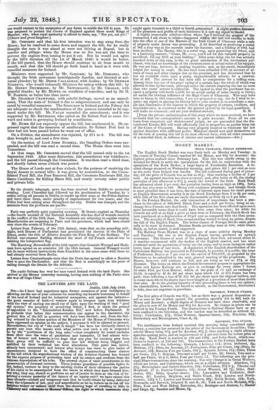THE LAWYERS AND THE LAND.
Dublin, 1314 Jody 1848. Sin—As I have had experience upon former *cessions of your indulgence in allowing me the use of your columns for recording my humble testimony in behalf of the land of Ireland and its industrial occupation, and against the lawyers— the great enemies of both—I venture again to trespass upon year kindness with the view of casting one small ray of light upon the working of that "good old system," the propriety of preserving which, I find, is made the ground of opposition to the "Encumbered Estates Bill," now before Parliament It is probable that before this communication can appear in the Spectator, the general fate of the bill in question will have been decided; and, front the feel- ing evinced by the better portion of the Members of the House of Commons who have expressed an opinion on the subject, I presume it will be allowed to proceed. Nevertheless, the cry of "the craft is danger has been too distinctly raised to permit any man who knows with what active zeal such a cry is responded to by the "gentlemen of the long robe,"—how completely its sound excludes from their ears the voice of patriotism and humanity, (I had almost writ- ten of honour and hooesty,)—to hope that any plan for rescuing prey from their grasp will be suffered to pass into law without being clogged and nullified by their technical bat fatal alterations. This game has, indeed, already been commeacsel; and lawyer after lawyer has risen to give notice of amendments designed to have the effect of counteracting those clauses of the bill which the unprofessional wisdom of the Solicitor-General has framed for the express purpose of protecting land and its oweers and creditors from the ruinous depredations of his tribe. The avowed object of their amendments is the preservation of dormant interests. Those jealous guardians of possible rights do not, indeed, venture to deny to the existing victim of their chicanery the justice of his claim to be emancipated from the bonds in which they have fettered him; but why, they say, should so profitless an act of justice be done at the risk of de- priving a remote posterity of the luxury of an equity suit? we have ruined this man already—should any temporary ease that he could obtain by being delivered from the trammels of law, poor and unprofitable as he is, induce us to cut off his helpless widow or unborn child from the cheering hope of revelling in bills in 'Chancery and references to Masters' Offices, the right to which easements they might again transmit to a third or fourth generation? A slight torninstance of the pleasures and profits of such heirlooms it is now my_objeot toitoord.
A highly respectable solicitor—from whose lips -I --r-qc.ixt4 the Acoqpnt of the
transaction I am about to relate—happened feVritonlha to oralk into the office of one of the Masters of the Irish Court of Chancery while a sale of property under decree was proceeding. A lot described as producing a rental of 981. a year was at the moment under the hammer, and a bidding of 1001. had been received. The Master, who is a noted wag, upon perceiving my friend, said in a bantering manner, "Come, Mr. —, you'll not let this valuable property be sacrificed: I'll say 2001. as your bidding." After some delay, the lot was actually knocked down at this sum, to the no great satisfaction of the involuntary pur- chaser, who had no knowledge of the circumstances or actual value of his bargain. He was not long, however, in making inquiries; and, as the result, immediately lodged the money in court. He has since been refunded 1701. on account of ar- rears of taxes and other charges due on the premises, and has discovered that he has an available claim upon a party, unquestionably solvent, for a renewal- fine of 401. The arrears he has been able to compromise for a trifling sum. Among them was one of ten years' rating of a certain tax; the whole of which was allowed to him by the court, although under the statute imposing the tax no more than two years' arrears is claimable. The upshot is, that the purchaser has se- cured a property well worth 1,5001. for an actual outlay of some twenty or thirty; all under the tutelary influence of the High Court of Chancery. Who may have been to blame in this transaction, I am not prepared to say, nor do I wish to in- quire: my object in placing its history before your readers is to contribute a sam- ple fact illustrative of the manner in which the property of owners, creditors, and remainder-men, is conserved under the present system by its legal guardians. I will make no comment; and am your obedient servant, H. M.
[From the private authentication of this story which we have received, we have no doubt that our correspondent's account is quite accurate. From all we can learn from competent and disinterested judges, we are persuaded that the En- cumbered Estates Bill will work effectually just in proportion as parties keep out of the Court of Chancery. Having very properly resolved to vindicate the law against disorders with sufficient power, Ministers should now gird themselves up for the task of gassing this bill in its most efficient form, with all other measures of a remedial kind, in defiance of sinister and narrow influences.—ED.]


























 Previous page
Previous page